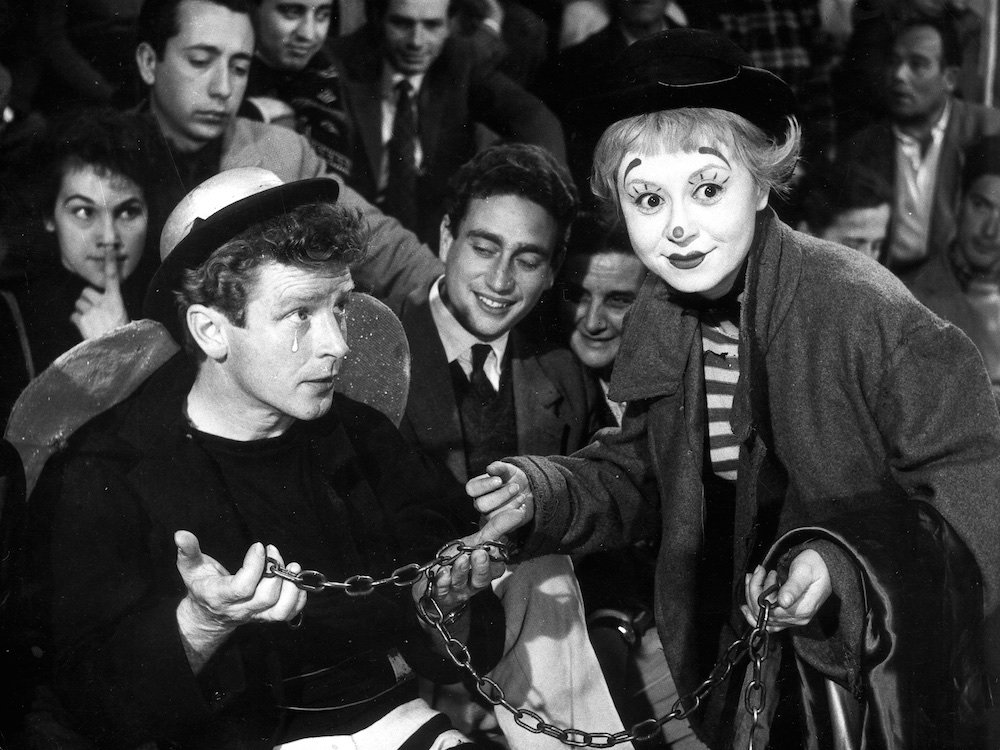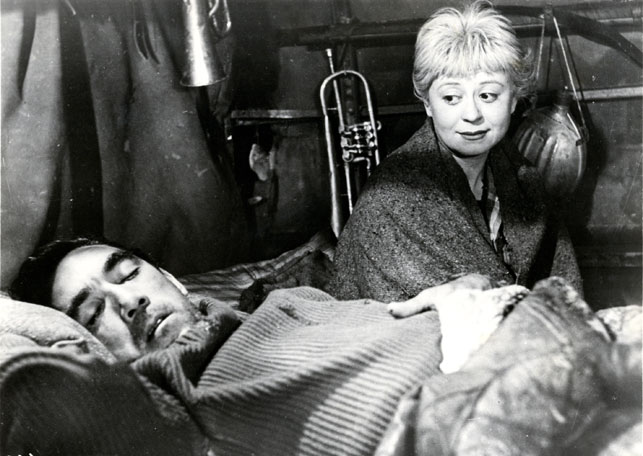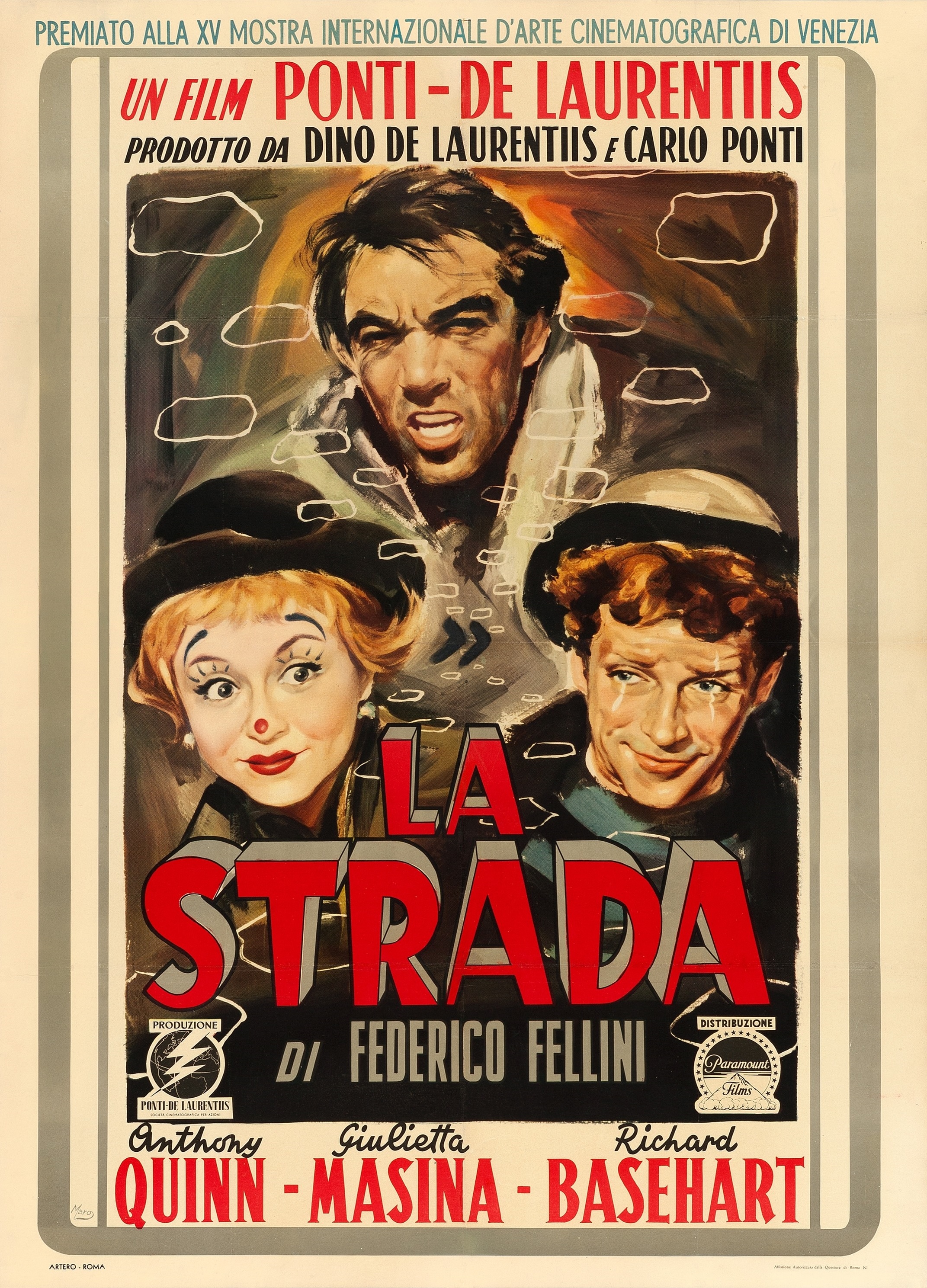Fellini @ 100: "La Strada"
 Monday, January 20, 2020 at 11:00PM
Monday, January 20, 2020 at 11:00PM A few volunteers from Team Experience are revisiting Federico Fellini classics for his centennial. Here's Mark Brinkerhoff...

My first recollection of watching La Strada is in a class at school as a youth. Oddly though, I neither can recall which class nor at what age exactly I saw it. But Federico Fellini’s 1954 breakthrough is nothing if not a film that sticks with you, like a bracing force which leaves an imprint that lasts.
A masterwork in Italian neorealism, La Strada (“The Road”) is set largely against the backdrop of a traveling circus, centering on a triangle of sorts between a trio of street performers...
There's a brutish lout named Zampano (Anthony Quinn), a shy young woman, Gesomina (Giulietta Masina, Fellini’s real-life wife), whom he buys into servitude, and a fellow performer known as “The Fool” (Richard Basehart) who becomes both a wedge and an unlikely liberator. The ways in which these characters converge, diverge, then converge again have ultimately tragic consequences, which Fellini threads beautifully, if bleakly, gorgeously filmed in black and white.
That the film even got made is something of a minor miracle. A famously tortured production—the director suffered a nervous breakdown during the shoot—La Strada owes its success as a compelling narrative not just to the eccentric characters who populate the margins and center, but also to the internationally diverse group of actors whom Fellini cast in the first place.

Quinn, a Mexican-born American actor, was part of the fantastic diaspora of Hollywood stars who decamped to Italy in the ‘50s to work with such greats as the recently celebrated Dino Di Laurentiis, Carlo Ponti, and Roberto Rossellini. Fellini himself was the beneficiary of Quinn’s pulsing energy, which he put to good use as the strongman here. There’s a gruffness to it, too, that pairs well with the diminutive demureness of Masina, who nevertheless demonstrates she is more than meets the eye.
It might be easy, especially at the time, to discount the Italian actress as merely a tabula rasa her filmmaker husband used to project and reflect his own designs, but to give such short shrift would be wholly unfair considering the subtle yet potent shadings Masina lends her character. Gesomina is the beating, battered heart of the film, soulfully grounding a story which easily could’ve devolved into cartoonish buffoonery without a deft touch.
 La Strada may have the most elongated awards trajectory in movie history. The film premiered in the fall of 1954 at the Venice Film Festival, where Fellini went on to win the Silver Lion. For the next three years it went on to be honored by critics and cinephiles around the world, culminating in its nabbing the very first Oscar for Best Foreign Language Film in 1957. And a richly deserved Academy Award win it certainly was.
La Strada may have the most elongated awards trajectory in movie history. The film premiered in the fall of 1954 at the Venice Film Festival, where Fellini went on to win the Silver Lion. For the next three years it went on to be honored by critics and cinephiles around the world, culminating in its nabbing the very first Oscar for Best Foreign Language Film in 1957. And a richly deserved Academy Award win it certainly was.
The Criterion Channel is streaming La Strada all month, along with many Fellini classics.



Reader Comments (12)
A formative film for me in my youth - introduced me to both the wonders of global cinema and one of my all-time favorite filmmakers!
As far as elongated awards trajectories, "Seven Samurai" was actually right there alongside "La Strada," with a Venice win in 1954 and Oscar recognition at the 1957 ceremony.
Love Masina so much here.
Beautiful little essay. One note: An Italian film scholar would groan at the notion that "La Strada" is a "neorealist" film. In fact, the neorealist partisans would denounce Fellini's 1954 film as a betrayal of neorealism, and it's never taught or written about in the scholarly world as a neorealist text. It implies a metaphysical perspective rather than a materialist one, and this the neorealists could not forgive. Put another way, it's more Catholic than Marxist and the core of neorealism is a Marxist/materialist perspective. Most scholars consider Umberto D. the last true neorealist film. (I know, I know, you can find lists that say everything from 8 !/2 to Gomorrah is a neorealist film, but who you going to believe, film scholars or the internet?)
When my husband finally had a chance to enjoy my extended family and spend time with them in Italy, he had an epiphany that involved Fellini's work. "I used to think that Fellini's films verged on the surreal," he said, "but now I realize that he really WAS a neorealist who reflected specific truths about Italian society and the Italian soul." To some extent, I agree (notwithstanding the fact that my husband was clearly poking fun at some of the highly dramatic scenarios that he was exposed to by virtue of coming into contact with my family. Caryn James paid a wonderful tribute to Fellini's relationship with reality in this piece from the New York Times: https://www.nytimes.com/1993/11/07/movies/film-view-fellini-s-world-was-so-real-it-was-bizarre.html
I love this film. It is one of my holy trinity of films that I will treasure and adore forever.
It's magical.
Literally the film that made me discover not only cinema but art in general. Pretty much defined my life.
Every time I watch this film, I remember that last image of Anthony Quinn's immolation amidst the swirling melodrama of Nino Rota's score. Punches at my emotional core. Each time. Plus Giulietta Masina's magical presence in this film and others is a rare true gift to cinema.
This was I think the third film by Fellini that I saw yet it was the first one that I saw that starred Giulietta Masina whom I fell in love with as I've seen her in five films that she did with Fellini so far. Man, she is such a presence to watch as she has charm but also can convey melancholia as I always think she is one of cinema's great actresses.
What a beautiful coincidence. Last night I had Sandra Milo in the table behind me at the restaurant
Best performance of the 50's, inches above Judy Garland in A Star is Born.
Giulietta Masina is a true gift to us all. Love this movie. Thanks for the article.
Stays with you is right. Years later, in a film class, we had to watch a bunch of films, and this was one. I wasn't in the headspace to watch much, but taking the test I suddenly remembered every single detail. Same with Chinatown, which was also assigned.